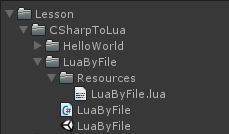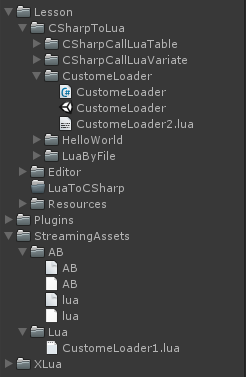Xlua:腾讯研发,开源免费
配置:文件解压,拷贝到Unity项目里
注意:Xlua文件夹不许移动,不许重命名
运行Xlua:
1、引用命名空间
2、创建虚拟机
3、运行lua语句
4、不需要时,释放虚拟机(LuaEnv:Lua的虚拟机)
using System.Collections; using System.Collections.Generic; using UnityEngine; using XLua;//1、引用Xlua的命名空间 public class HelloWorld : MonoBehaviour { //lua的语句 private string lua = @"print('Hello World') return 1, 'nihao', true"; //2、创建一个运行lua语句的lua虚拟机 private LuaEnv luaEnv = new LuaEnv(); void Start() { //4、运行lua的语句 //这个方法的参数就是lua的语句,返回值就是运行lua,lua里的最终的返回内容 object[] obj_arr = luaEnv.DoString(lua); foreach (var item in obj_arr) { Debug.Log(item); } } private void OnDestroy() { //3、不需要虚拟机的时候,需要把虚拟机释放掉 luaEnv.Dispose(); } }
C#调用Lua的文件:
1、Lua文件的后缀必须是.lua.txt的,file.lua.txt
2、Lua文件必须放在Resources文件夹下,不可以是子文件夹,默认加载器的原因
3、Lua文件的默认编码格式必须是UTF-8的。
4、使用Lua的关键字require调用,不需要写文件后缀,只需要写文件名
----例如:file.lua.txt; require 'file'
5、对于文件的返回值,需要写成 return require 'file'才能获得


using System.Collections; using System.Collections.Generic; using UnityEngine; using XLua; public class LuaByFile : MonoBehaviour { private string lua = @"require 'LuaByFile'"; //private string lua = @"a = require 'LuaByFile' retrun a"; //private string lua = @"retrun require 'LuaByFile'"; private LuaEnv luaEnv = new LuaEnv(); void Start() { object[] obj_arr = luaEnv.DoString(lua); } private void OnDestroy() { luaEnv.Dispose(); } }
自定义的加载器:能执行我们想要执行的指定文件夹下的Lua文件
自定义的加载器的参数:require传入的文件名
自定义的加载器的返回值:要执行的Luad的语句转换成的字节数组(UTF-8转换),如果返回null。证明未找到文件。
一个lua虚拟机能添加无数个自定义加载器,从第一个加载器中开始找,如果找到了(未返回null),那么就不执行之后的其他的加载器,如果所有的自定义的加载器都未找到,执行默认的加载器,从Resources文件夹中寻找文件,如果默认的也未找到,直接报错。
.lua.txt文件打成AB包

using System.Collections; using System.Collections.Generic; using UnityEngine; using XLua; using System.IO; using System.Text; public class CustomeLoader : MonoBehaviour { private LuaEnv luaEnv = new LuaEnv(); //该文件不在Resources下,默认加载器加载不到 private string lua = @"require 'CustomeLoader2'"; void Start () { //添加一个自定义的加载器 luaEnv.AddLoader(CustomeLoader1); luaEnv.AddLoader(CustomeLoader2); luaEnv.DoString(lua); } private void OnDestroy() { luaEnv.Dispose(); } /// <summary> /// 自定义的加载器 /// </summary> /// <param name="filePath">参数是require后的那个文件名字</param> /// <returns></returns> /// 返回值就是要执行的lua的转换之后的字节数组,如果返回值是null证明我们未找到该lua文件 byte[] CustomeLoader1(ref string filePath) { //filePath:参数是require后的那个文件名字 //byte[] bytes = System.Text.Encoding.UTF8.GetBytes("print('hello world')"); //文件所在的绝对路径 string path = Application.streamingAssetsPath + "/Lua/" + filePath + ".lua.txt"; if (!File.Exists(path)) { return null;//如果不存在该文件,直接返回null } StreamReader sr = new StreamReader(path, System.Text.Encoding.UTF8); string lua = ""; try { lua = sr.ReadToEnd(); } catch (System.Exception) { throw; } sr.Close(); if (lua == "")//如果读取内容为空串,那么返回null,证明未找到该文件 { return null; } else { byte[] bytes = System.Text.Encoding.UTF8.GetBytes(lua); return bytes; } } /// <summary> /// 从ab包中加载lua文件 /// </summary> /// <param name="filePath"></param> /// <returns></returns> byte[] CustomeLoader2(ref string filePath) { //加载AB包 AssetBundle ab = AssetBundle.LoadFromFile(Application.streamingAssetsPath + "/AB/lua"); //从ab包中加载所需要的lua文件 TextAsset lua = ab.LoadAsset<TextAsset>(filePath + ".lua"); if (lua != null) { return lua.bytes; } return null; } }
C#访问Lua文件里的变量和方法:
C#访问Lua的全局变量
虚拟机执行一个lua语句之后,lua里的全局的变量或方法,
都存放在luaEnv.Global中,从Global中获取这些全的变量或方法。
CSharpCallLuaVariate.lua.txt
print('开始执行Variate.lua') a = 1 b = 1.2 c = true d = '小明' print('开始执行Variate.lua')
using System.Collections; using System.Collections.Generic; using UnityEngine; using XLua; public class CSharpCallLuaVariate : MonoBehaviour { private LuaEnv luaEnv = new LuaEnv(); void Start () { luaEnv.DoString("require 'CSharpCallLuaVariate'"); //虚拟机执行一个lua语句之后,lua里的全局的变量或方法 //都存放在luaEnv.Global中,从Global中获取这些全的变量或方法 //泛型是要接收的变量类型,参数是lua里的变量名字 //返回值就是变量的值 //int int a = luaEnv.Global.Get<int>("a"); Debug.Log("a: " + a); //float float b = luaEnv.Global.Get<float>("b"); Debug.Log("b: " + b); //bool bool c = luaEnv.Global.Get<bool>("c"); Debug.Log("c: " + c); //string string d = luaEnv.Global.Get<string>("d"); Debug.Log("d: " + d); } private void OnDestroy() { luaEnv.Dispose(); } }
C#访问全局的table
1、映射到类或结构体中(值拷贝过程)
只能把table中的键值对映射到类中的公共变量,并且变量名与键名一致。
对于类中如果变量多于table的键值对,table键值对多余类中变量,都没有任何的影响
2、使用接口映射
不光能映射基本类型,还能映射table中的方法。
Table中的键与接口中的属性名或方法名对应上。
3、使用字典或list映射
List映射:只能映射索引的数字且连续的,并且只能映射值与list指定了类型一致的元素。
字典映射:当指定了字典的键类型和值类型之后,table中键与字典的键的类型一致,且键对应的值的类型与字典中值类型一致的也会映射过来。
4、使用XLua提供的LuaTable来映射
CSharpCallLuaTable.lua.txt
print('开始执行CSharpCallLuaTable.lua') t1 = {1, 2, 5, "小明", "nihao"} t1.f1 = "name" t1.f2 = true t1.id = 1 t1[6] = 6 t1[9] = 9 t1.func1 = function() print("func1") end print('开始执行CSharpCallLuaTable.lua')
using System.Collections; using System.Collections.Generic; using UnityEngine; using XLua; public class CSharpCallLuaTable : MonoBehaviour { private LuaEnv luaEnv = new LuaEnv(); void Start() { luaEnv.DoString("require 'CSharpCallLuaTable'"); //1、使用class或struct去映射table(值拷贝过程) T1 t1 = luaEnv.Global.Get<T1>("t1"); t1.Print(); //2、可以使用接口去映射(引用拷贝过程) IT1 it1 = luaEnv.Global.Get<IT1>("t1"); Debug.Log("it1:f1: " + it1.f1 + ",f2: " + it1.f2 + ",id: " + it1.id); it1.func1(); //3、映射到字典或List中(值拷贝过程) List<object> list = luaEnv.Global.Get<List<object>>("t1"); foreach (var item in list) { Debug.Log("list: " + item); } Dictionary<string, object> dic = luaEnv.Global.Get<Dictionary<string, object>>("t1"); foreach (KeyValuePair<string, object> item in dic) { Debug.Log("键: " + item.Key + "值: " + item.Value); } //4、使用XLua提供的LuaTable来映射 LuaTable lt = luaEnv.Global.Get<LuaTable>("t1"); //对于table中字符串作为键的键值对 string f1 = lt.Get<string>("f1"); Debug.Log("f1: " + f1); //对于table中的数字类型的索引的键值对,在取的时候需要指定键的类型和值的类型 string a = lt.Get<int, string>(4); Debug.Log("第四个索引: " + a); } private void OnDestroy() { luaEnv.Dispose(); } public class T1 { public string f1; public bool f2; public int id; public void Print() { Debug.Log("f1: " + f1 + ",f2: " + f2 + ",id: " + id); } } [CSharpCallLua]//需要添加此特性 public interface IT1//接口里不能有变量,可以用变量 { string f1 { get; set; } bool f2 { get; set; } int id { get; set; } void func1(); } }
C#映射全局的方法
1、使用委托映射
Lua中多返回值的情况:如果C#的委托有返回值,那么lua的函数的第一个返回值就是委托的返回值,第二个返回值之后依次对应委托里的out或ref参数传出。
如果C#的委托是无返回值的,那么lua函数从第一个返回值开始,依次对应委托的out或ref参数传出。
2、使用LuaFunction映射
CSharpCallLuaFunction.lua.txt
print('开始执行CSharpCallLuaFunction.lua') --无参无返回值 func1 = function() print("无参无返回值:func1") end --有参无返回值 func2 = function(a, b) print("有参无返回值:func2:", a, b) end --无参有返回值 func3 = function() print("无参有返回值:func3") return 1 end --有参有返回值 func4 = function(a, b) print("有参有返回值:func4:", a, b) return true end --无参多返回值 func5 = function() print("无参多返回值:func5:") return true, false, 1, "小明" end --有参多返回值 func6 = function(a, b) print("有参多返回值:func6:", a, b) return true, false, 1, "小明" end print('开始执行CSharpCallLuaFunction.lua')
using System.Collections; using System.Collections.Generic; using UnityEngine; using XLua; public class CSharpCallLuaFunction : MonoBehaviour { private LuaEnv luaEnv = new LuaEnv(); //映射无参无返回值 [CSharpCallLua]//加特性自动适配,不用再去做映射,效率高 private delegate void Func1(); //映射有参无返回值 参数可以是任意类型 [CSharpCallLua] private delegate void Func2(string a, int b); //无参有返回值 最好委托返回值类型与lua中方法的返回值相对应 [CSharpCallLua] private delegate int Func3(); [CSharpCallLua] private delegate void Func4(); //无参多返回值 [CSharpCallLua] private delegate bool Func5(out bool outOne, ref int outTwo, out string outThree); //有参多返回值 [CSharpCallLua] private delegate bool Func6(int a, out bool outOne, int b); // Use this for initialization void Start () { luaEnv.DoString("require'CSharpCallLuaFunction'"); //全局的方法依旧存储在 Global中 //1. 全局方法映射到委托 Func1 func1 = luaEnv.Global.Get<Func1>("func1"); func1(); // 对于Lua中任意的方法,C#任意的一个委托类型都能映射过来, // 只是对于返回值和参数的情况会忽略处理 // 最好使用相对应的委托去映射 //Del func2 = luaenv.Global.Get<Del>("func6"); // func2(); Func2 func2 = luaEnv.Global.Get<Func2>("func2"); func2("小明", 81); Func3 func3 = luaEnv.Global.Get<Func3>("func3"); Debug.Log("func3的返回值" + func3()); Func5 func5 = luaEnv.Global.Get<Func5>("func5"); bool outOne = false; int outTwo = 0; string outThree =""; bool rt = func5(out outOne, ref outTwo, out outThree); Debug.Log("func5:第1个返回值:" + rt + "第2个返回值:" + outOne + "第3个返回值:" + outTwo + "第4个返回值:" + outThree); Func6 func6 = luaEnv.Global.Get<Func6>("func6"); bool out1; bool rt1 = func6(3, out out1, 4); Debug.Log(rt1 + "------" + out1); //2. LuaFunction映射,效率低 LuaFunction luaFunc6 = luaEnv.Global.Get<LuaFunction>("func6"); //调用方法 参数就是方法的参数,返回值就是lua方法的返回值,多返回值存入数组中 object[] obj_Arr = luaFunc6.Call(1, 2); foreach (var item in obj_Arr) { Debug.Log(item); } } // Update is called once per frame void Update () { } private void OnDestroy() { luaEnv.Dispose(); } }
Lua调用C#的变量或方法
调用静态的变量:CS.命名空间.类名.变量或属性名 或 CS.类名.变量或属性名
调用成员的变量:
1、类实例化:变量名 = CS.命名空间.类名() 或 CS.类名()
2、调用成员变量或属性:对象名.变量名或属性名
Lua调用C#的方法
静态:调用C#的静态方法: CS.命名空间.类名.方法名() 或 CS.类名.方法名()
非静态的: 调用C#的成员方法: 对象名:方法名()
NewGameObject.lua.txt
print('开始执行NewGameObject.lua') --C#:GameObject obj = new UnityEngine.GameObject(); --实例化一个对象 obj = CS.UnityEngine.GameObject(); print('结束执行NewGameObject.lua')
using System.Collections; using System.Collections.Generic; using UnityEngine; using XLua; public class NewGameObject : MonoBehaviour { private LuaEnv luaEnv = new LuaEnv(); void Start () { luaEnv.DoString("require 'NewGameObject' "); //GameObject obj = new UnityEngine.GameObject(); } private void OnDestroy() { luaEnv.Dispose(); } }
LuaCallCSharpVariate.lua.txt
print('开始执行LuaCallCSharpVariate.lua') --静态变量:CS.命名空间.类名.变量或属性名 或 CS.类名.变量或属性名 print("A静态变量", CS.Lesson.A.name) --调用成员变量,首先需要new出来对象 a = CS.Lesson.A() --调用成员变量:对象名.变量名或属性名 print("A成员变量", a.id, a.Sex) print('结束执行LuaCallCSharpVariate.lua')
using System.Collections; using System.Collections.Generic; using UnityEngine; using XLua; public class LuaCallCSharpVariate : MonoBehaviour { private LuaEnv luaEnv = new LuaEnv(); void Start() { luaEnv.DoString("require 'LuaCallCSharpVariate' "); } private void OnDestroy() { luaEnv.Dispose(); } } namespace Lesson { public class A { public static string name = "A"; public int id; private bool sex; public bool Sex { get { return sex; } set { sex = value; } } public A() { id = 1; sex = true; } } }
LuaCallCSharpFunction.lua.txt
print('开始执行LuaCallCSharpFunction.lua') --C# B.StaticFunc() --调用C#的静态方法:CS.命名空间.类名.方法名() 或 CS.类名.方法名() CS.Lesson.B.StaticFunc() --调用C#的成员方法 --实例化一个类对象 b = CS.Lesson.B() --调用C#的成员方法:对象名:方法名() b:UnStaticFunc() --Xlua支持通过子类的对象去访问父类的方法、属性、变量 b:Func() print('结束执行LuaCallCSharpFunction.lua')
using System.Collections; using System.Collections.Generic; using UnityEngine; using XLua; public class LuaCallCSharpFunction : MonoBehaviour { private LuaEnv luaEnv = new LuaEnv(); void Start() { luaEnv.DoString("require 'LuaCallCSharpFunction' "); } void Update() { } private void OnDestroy() { luaEnv.Dispose(); } } namespace Lesson { public class B : C { public static void StaticFunc() { Debug.Log("这是一个静态方法"); } public void UnStaticFunc() { Debug.Log("这是一个非静态方法"); } } public class C { public void Func() { Debug.Log("Func"); } } }
案例 - 用Lua实现游戏物体旋转移动
Move.lua.txt
print("开始执行Move") --参数就是Move的类对象 Set = function(self) move = self end Update = function() --C# transform.Rotate(Vector3.up*30 * Time.deltaTime); print("Update") move.transform:Rotate(CS.UnityEngine.Vector3.up * 30 * CS.UnityEngine.Time.deltaTime); v = CS.UnityEngine.Input.GetAxis("Vertical"); h = CS.UnityEngine.Input.GetAxis("Horizontal"); move.transform:Translate(CS.UnityEngine.Vector3(h,0,v) * CS.UnityEngine.Time.deltaTime); end
using System.Collections; using System.Collections.Generic; using UnityEngine; using XLua; public class Move : MonoBehaviour { private LuaEnv luaenv = new LuaEnv(); [CSharpCallLua] private delegate void Del(); [CSharpCallLua] private delegate void Set(Move move); private Del update; void Start() { luaenv.DoString("require 'Move'"); Set set = luaenv.Global.Get<Set>("Set"); set(this);//把自己传递到lua中去 update = luaenv.Global.Get<Del>("Update"); } void Update() { //transform.Rotate(Vector3.up*30 * Time.deltaTime); //transform /* float v = Input.GetAxis("Vertical"); float h = Input.GetAxis("Horizontal"); transform.Translate(new Vector3(h,0,v) * Time.deltaTime); */ if (null != update) { update(); } } private void OnDestroy() { update = null; luaenv.Dispose(); } }